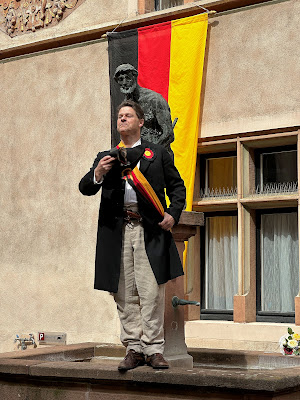Georg Herwegh, the poet of freedom, named one of his poems from 1841
An Alley for Freedom.
This alley is said to have been opened by
Arnold von Winkelried to his fellow
Confederates at the Battle of Sempach in 1386. He grabbed a bundle of lances
from the Habsburg knights and threw himself into the breach, impaling
himself.
Read more in German.
The motto served my friend Andreas Meckel as the title of a scenic
representation of the revolutionary events in Freiburg at
Easter 1848.

|
|
Organizer Heinz Siebold and author Andreas Meckel are in good spirits
|
Members of the Initiative for the Commemoration of the Baden Revolution
organized the spectacle in the Freiburg Regional Administrative Council
courtyard on Easter Monday.

|
|
Mayor Ulrich von Kirchbach greeted the audience
|

|
|
Heinz Siebold introduced the participants as there were: |

|
|
The Biedermeier Group Offenburg
|

|
|
The Hecker Group from Offenburg
|

|
|
The Hecker Singers from Schopfheim
|
And the
Dramatis Personae:
Carl Mez
(Wigand Alpers), a sewing thread manufacturer and early social benefactor.
Emma Herwegh
(Cornelia Schmidt), the wife of poet Georg Herwegh and an ardent freedom fighter.

|
Battle near Kandern.
Note the democratic colors: Black-Gold-Red!
|
On their way from Constance to Karlsruhe, Friedrich Hecker's irregulars were
crushed by government troops near Kandern on Maundy Thursday. The news also
reaches Freiburg, where 1500 armed revolutionaries, threatened with the
enclosure of the city by soldiers of the German Confederation, are waiting for
their relief by Hecker's men.
Read more in German.
 |
| Note the correct colors: Black-Red-Gold. |
In Freiburg, Carl von Rotteck, Georg von Langsdorff, and Carl Mez discuss the
situation. Is the news of Hecker's military defeat fake news?
Isn't an advance guard under Hecker's adjutant
Franz Sigel
and
Gustav Struve
standing in Horben to march on Freiburg? Or will the city be stormed
beforehand by the Grand Duke's troops under the leadership of
War Minister Hoffmann?

|
|
Emancipated Emma shows one of her attributes.
|
Emma Herwegh bursts into the scene, alternating between hope and despair,
and announces that the Democratic Union of Germans living in political exile
in Paris, led by her husband, has reached Strasbourg. The armed men want to come to aid the revolutionaries on the other side of the Rhine. An offer to
which the German irregulars only half-heartedly agree since the crossing of
the Rhine is misunderstood as a French intervention.

|
Heavy fighting at Freiburg's Schwabentor.
Note the colors:
Red-Gold-Black!
|
It comes as feared. Struve's vanguard is defeated before Freiburg near
Günterstal, and the federal troops take the city. Further attempts in
1849 to establish a democratic republic in Baden also ended in bloodshed.
Read more in German.And yet the sacrifices were
not in vain. Many popular demands of the time, such as freedom of the press,
universal suffrage, independent courts, education for all, and a democratic
army, were reflected in the texts of the Weimar Constitution and are part of
today's Basic Law of the Federal Republic of Germany.
Olaf Creutzberg's talent as a revolutionary singer is legendary. Ultimately,
we sang along to the famous lied: Die Gedanken sind frei (Thoughts
are Free).
*















No comments:
Post a Comment